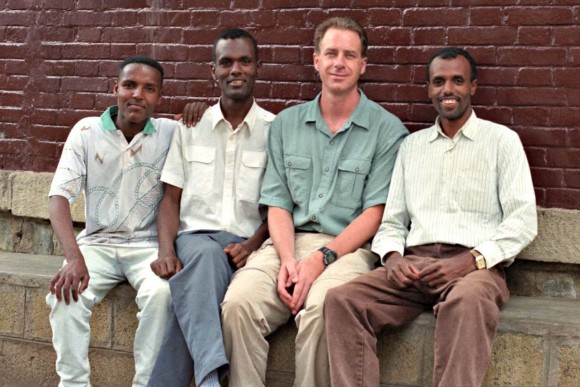018 – A Family Tree
Afternoon was a time for taking more pictures of the Tiru Gondar family. Zebachew, Sisay and Tadele traded sunglasses and jackets amongst themselves to achieve just the right note of affluence for the camera.
It was also time to learn more about the family and Zebachew drew me a family tree. Their family came from a rural area near Bahar Dar in Gondar on the shore of Lake Tana. His grandmother, Aremitu, and grandfather, Negash, had eight children. Five were still in Gondar. Three had come to Addis.
Tirunesh, Zebachew’s aunt, and the first of the three to come to Addis, had no children and was the power of the bunch. She was an imposing older woman, always richly dressed in clothes that contrasted sharply with the traditional tattoos on her chin and neck like a collection of blue necklaces. Tirunesh owned the hotel. The ‘Tiru’ in Tiru Gondar means ‘good’ and came from her name. Everyone worked for her and no one got a free ride, especially me. A tight system of receipts and special plastic chips, like poker chips, were used to account for every meal eaten, every beer drunk and every game of billiardo played. Zebachew felt she was a tightwad and resented her for not buying him new clothes. Zebachew claimed he only got 60 birr per month plus room and board. For the hours he put in that was poor pay indeed.
Kasanesh, Zebachew’s mother, also came to Addis along with her six children, all of whom worked at the hotel in some capacity. Zebachew was the eldest. Her husband was Oromo, from the south of the country, and Zebachew told me about him in a simple one-page ‘life history.’ I hadn’t asked for it. One day Zebachew simply showed up with it and gave it to me:
“My life history. I have mother and father. My mother is very kind, but my father is very cruel. One day my father kick my mother. At that time I was cry because my mother sick. But my father said, stop cry and he kick me. After this my mother jump out window and she run fast so she fall down. At that time I was running fast to mother because she was wounded.
After 5 month I start school. I continued up to 12 grade and I complete 12 grade. At that time I have not advantage because I have not full point.
Now I am worker boy in my aunt house, but I am not satisfied because she is not kind for me. She don’t want buy trouser, shoes, shirt. My aunt pay for me salary (60 birr) only, so this money is not enough to me to cloth, shoes. I will be a rich man or poor man or died. I think I will be work hard so I was very excellent student.
I have many life history. Almost 10 pages more but English language is hard to me. Please don’t forget me. I remember you. From Zebachew.”
The third daughter to come to Addis was Bancha. Her four children, Abebe, the oldest, Tadele, Sisay and Asinake, also worked at the Tiru Gondar. If there was a leader in the group it appeared to be Abebe. He was the oldest of all the cousins and the most responsible, but I spent most of my time with Zebachew, Tadale and Sisay, who spoke the best English and were the most eager to hang out with their pet foreigner.
At the bottom of the family tree, Zebachew made a list of the seven additional people who rounded out the Tiru staff. There was Gebre, the young ‘zebenya,’ who slept in the guard box in the yard. He was sometimes spelled by Getachew, who also ran the billiardo room. Three older women worked in the kitchen as cooks: Tadelech and two women who shared the name Almaze. The cashier, Siray, was a distant relative and handled the responsible job of keeping track of all the coloured tokens. My favourite was the seventh, Alem, who worked as a waitress. She had a pleasant smile, a friendly manner and helped me feel at home without overwhelming me with hospitality as so many of the others did. Her name was Amharic for ‘world.’
Many of the other cousins, who didn’t have specific jobs that I could see, were involved in the household’s many other tasks. The backyard was always full of mattresses being taken apart and the stuffings aired out, vegetables being cleaned and chopped, and spices being sun-dried. There was always laundry that needed to be done, both hotel and household laundry, dishes that needed to be washed, young children that needed to be cared for, and floors that needed to be swept. Every day animals would arrive and these would be slaughtered in the back in preparation for the day’s meals. There were work shifts, but they weren’t strictly adhered to. Everyone seemed to work pretty much all the time. There wasn’t a strict dividing line between their personal lives, family lives and work lives.
Tags: Ethiopia Bike Trip, Lake Tana, Tiru Gondar

